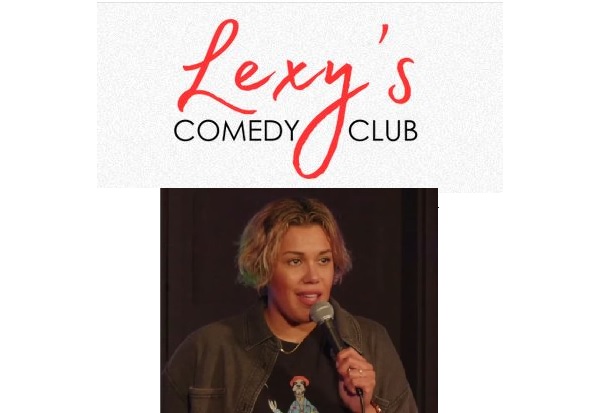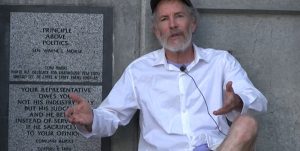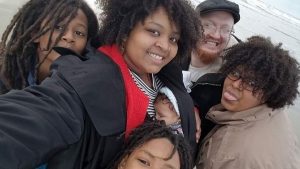KEPW ‘Talk Is Cheap’ interviews Lexis Shardé
12 min read
Presenter: Every Saturday at 4 p.m. on KEPW, you can hear Curtis Blankinship, host of the show, Talk is Cheap. Here are some excerpts from his complete show March 29, an interview with local comedian Lexis Shardé:
Curtis Blankinship (KEPW, Talk Is Cheap): All right, I’m here talking with local comedian Lexis Shardé. So how long have you been doing comedy?
Lexis Shardé (Lexy’s Comedy Club): This coming— this year it’ll be 13 years.
[00:00:24] Curtis Blankinship (KEPW, Talk Is Cheap): Wow! All right, and you did a charity benefit recently, right?
[00:00:28] Lexis Shardé (Lexy’s Comedy Club): Yeah, I started a nonprofit last year. The nonprofit’s called Lexy’s Playground. Right now, we’re focusing on working with children doing improv.
[00:00:38] Improv is how I got into comedy. And I honestly wish I would have got into it at a younger age because it really helped me blossom. I was pretty shy, pretty quiet. Most people that know me in real life outside of comedy, they’re usually pretty surprised that I do comedy because I am kind of a pretty quiet person. I can be very observant and just take everything in, but improv definitely changed that for me.
[00:01:05] And so I want to give that opportunity to young kids to be able to be assertive and be creative because when you have those skills that you learned from improv, it can really flourish your life and what you want to do.
[00:01:17] So yeah, we’re working with kids mostly, but we have some other things that we want to work towards, helping comedians with their careers and whatnot. So that’s what Lexy’s Playground is all about.
[00:01:30] Curtis Blankinship (KEPW, Talk Is Cheap): All right, and so a lot of us are working out our personal trauma at the open mics. So it helps, it helps to get less stage fright, to be comfortable talking in front of people absolutely. (Yes.) Do you have an example of some kid who’s changed been changed through work through improv?
[00:01:48] Lexis Shardé (Lexy’s Comedy Club): Yeah, you see it almost immediately. I’ve been working with some girls over at Ophelia’s Place, which is a nonprofit, specifically for girls, providing a safe space for them. And we do a weekly workshop over there. And there’ll be some girls that come in and they don’t really want to participate. They kind of just want to watch and they don’t do the warm-up.
[00:02:10] But after they kind of see what we’re able to create and what the games and activities that we want to do, they really get into it. And even when they decide that they want to do it the first time, they may be kind of shy and quiet, maybe not project as much. But then you really start to see them open up. Because you really are just being in the present moment and thinking on the top of your head which is a way of really trusting yourself.
[00:02:34] I think we, as adults especially and even as children, we get too much into our heads and thinking about, ‘What’s the right thing to say, what’s the right thing to do?’ And so improv really just helps you kind of get back to your instincts and trusting that gut instinct.
[00:02:49] Curtis Blankinship (KEPW, Talk Is Cheap): And can you give me an example of an exercise just out of curiosity? What type of stuff are you having them do as an improv?
[00:02:56] Lexis Shardé (Lexy’s Comedy Club): So one of our warm-up games is like a classic game, ‘Yes, And‘ which is like a traditional improv rule, which is: You don’t ever disagree. You always go along with the flow.
[00:03:08] So if I were to say, ‘Hey, Suss D, you are crazy, and it smells like you didn’t take a shower,’ instead of saying, ‘Oh my God, no,’ you would go, ‘Yes, and,’ and then you would just add on to it. And so that’s just like a fun game, going along with it and then, you know, going off the top of your head and adding something onto it.
[00:03:32] Curtis Blankinship (KEPW, Talk Is Cheap): So you start them off right away, that’s basic improv. There’s no kids improv or something.
[00:03:38] Lexis Shardé (Lexy’s Comedy Club): So I studied at Upright Citizens Brigade in Los Angeles. And then, you know, there’s Second City and each school kind of has, like, their different principles that they go by. But I tried to break it down into kind of, like, simple games that the kids can get.
[00:03:51] I think the most challenging thing with the kids is sometimes like they don’t make the scene make sense. So you kind of have to keep them on track. So sometimes I do have to stop them and say, ‘Okay, let’s start the scene over and make sure that the choices that you’re making make sense so everyone can follow along.’
[00:04:06] I think that’s the biggest challenge with the kids is ’cause they just want to go with whatever they have going on in their head and they don’t really care what anyone else is doing. Sometimes they just want the spotlight on themselves.
[00:04:16] But those basic games and warm-up games like those short, like, we don’t do a lot of long-form improv. We do a lot of short-form improv, just like quick games. So they really get the hang of it.
[00:04:29] Curtis Blankinship (KEPW, Talk Is Cheap): All right, so Diana Ramsey is one of the comics, is one of the local comics and she came up with this question, that I always ask all the comics, which is: What was it like, what was your first time doing standup like? Did you bomb?
[00:04:41] Lexis Shardé (Lexy’s Comedy Club): No, I actually did very well. When I watch the video though, sometimes I cringe, like, ‘Who was that person?’ Changed so much since then.
[00:04:53] But my first standup experience was at Flappers in Burbank, California. I signed up for one of their open mic ‘bringer shows,’ which essentially you sign up for it and you know, you should just bring a certain amount of people.
[00:05:08] I think I brought like one person and I had five minutes that I’d been working on for, I don’t know, four weeks with one of my friends that kind of convinced me to do comedy. And I did well. I mean, that first five minutes, like, I still use that material. And I’ve evolved it and expanded on it, so it’s kind of been like that was, like, my staple. And I still watch that video every once in a while, but it was definitely scary, but I also had fun.
[00:05:40] Curtis Blankinship (KEPW, Talk Is Cheap): Right, and so you didn’t take a class with them?
[00:05:43] Lexis Shardé (Lexy’s Comedy Club): No, I started stand-up after doing improv, so I think that improv definitely helped. So I did an improv for a year before I started writing for stand-up comedy.
[00:05:55] Curtis Blankinship (KEPW, Talk Is Cheap): Well, but so you’ve got to build a routine first though? (Absolutely, yes.) I have a five-minute set. I keep trying to do five-minute sets and write those down and then move on to another five-minute set. Is there a technique that you’re using to practice your routine?
[00:06:10] Lexis Shardé (Lexy’s Comedy Club): Well, I follow Judy Carter’s Comedy Bible. That’s kind of been bible for me. There’s a lot of good exercises in there. When I teach my stand-up comedy classes, I use a lot of her principles. I think taking classes or reading a book, anything that kind of teaches you the basic structures of how to write a joke, the basic rules of comedy, is going to help guide you to, because it is formulaic, it really is.
[00:06:41] You know, laughs per minute is super important, especially when you’re just trying to get the audience to listen. The main thing is you want the audience to listen and engage to what you’re saying. And so, doing exercises, anything to make you a stronger writer.
[00:06:58] And then having that support group around you too, of other comedians. Sometimes if I’m writing something and I’m like, ‘Hmm.’ Maybe I tried it on stage and it just didn’t hit the way that I wanted, you know, I may go to another comic and ask like, ‘Hey, how would you punch this up?’ I may go to multiple comics and ask, ‘Hey, how would you punch this up?’ and take what I like best out of what I was given and then rewrite the joke.
[00:07:23] Comedy really is a team sport. We have to write things that are relatable, that people can relate to. So when you get kind of opinions, I know there’s a lot of comedians that hate it when other comics are like, ‘Hey, that was a great joke. Let me give you a tag’ or whatever.
I, personally, I love it because it really is like, we’ve got to make each other better. And I take that as a compliment that someone is wanting to give that small investment to me to make my material stronger.
[00:07:52] I try to keep up with pop culture. I don’t really watch the news a lot. I don’t have cable anymore, but you know, based off what I see on like Instagram and Facebook, I try to keep up with that stuff. Because, like, being an LA comic, like when I lived in LA, you know, people love the stuff about the celebrities.
[00:08:09] And so I would write a lot of pop culture jokes as like current events as that, you know, first two, three minutes of relatable material that, you know, everyone may understand before I get into, you know, more personal jokes.
[00:08:25] I’ve noticed that here in Eugene, sometimes those jokes don’t hit as well. You know, it’s just, and I also think that we’re just in a different time now, like, a lot more people, like, don’t watch the news, don’t want to keep up with celebrities and stuff like that. And I totally understand because I’m kind of in the same boat.
[00:08:45] So, you know, sticking to the current events, politics is always like really touchy. I think the best way that a comic can do anything political is really taking a perspective from both sides, because then you’re going to win the full audience and kind of having a neutral position and just pointing out like what’s funny about it. Right.
[00:09:07] Curtis Blankinship (KEPW, Talk Is Cheap): I noticed George Carlin, even though I would call him liberal, he does, he makes fun of liberals too, so it’s important to be balanced.
[00:09:18] Lexis Shardé (Lexy’s Comedy Club): Yeah, you got to be able to make fun of yourself. And that’s why I think so many comics get kind of hung up in like a self-deprecating type of comedy. You know, but there is like a, there’s like a, I can’t remember who was explaining it or who it comes from, but I remember this one comedian who was a friend of mine that was explaining the point system of comedy.
It’s like, you want to stay at zero. And so when you are self-deprecating that gets you at -1, right? But if you get too negative then you’re going to lose the audience because you’re going to start making them sad.
[00:09:52] When you start making fun of other people, you’re at, you know,+1, +2. But you don’t want to put yourself up on a pedestal and make it seem like you’re better than everyone, so you want to try to stay at zero and kind of fluctuate through there. And, I don’t know, that just resonated with me.
[00:10:08] And so I think the same thing goes with, you know, punching up, punching down, right? Like, if you’re going to punch, you want to punch up. You don’t necessarily want to punch down. That’s kind of like the rule. You can break that, but I think it’s okay if you punch down if you’re also kind of punching at yourself.
[00:10:21] Curtis Blankinship (KEPW, Talk Is Cheap): So do you recommend going to festivals?
[00:10:24] Lexis Shardé (Lexy’s Comedy Club): Yeah, absolutely. I think I’ve done a number of festivals and honestly each one has you know expanded my network, my circle. It’s made me stronger as a comic because you know you don’t want to show up to a festival and do a weak set, like, you want to, you know, go strong. So, yeah, I think, I highly recommend it. If you have, you know, if a comic has the funds to go.
[00:10:54] I mean, the fees aren’t too crazy. It’s just like $25 to $50 for a submission fee, but then, you know, the travel depending on where it’s going. So like for me personally, I like to try to aim for festivals that are in cities where I have a friend or a family member that I can stay with and kind of kill two birds with one stone so to speak. And then also you know have a support system of people that will be there for me.
[00:11:21] But yeah, I highly recommend it. You get to see a lot of really great comics. You make some great connections. You never know what kind of opportunities can, you know, come from those. Sometimes there’s prizes in the comedy festivals, especially if there’s a contest.
[00:11:37] Sometimes there’s, you know, scouters or managers, so to speak, that are looking for new talent to either represent or, you know, if they’re producing some sort of project. So you really never know what comes out of those opportunities and it really is a good idea to hit that comedy circuit because you’re also touring, so it expands your audience as well.
[00:12:01] Curtis Blankinship (KEPW, Talk Is Cheap): Contests are different though. Contests are a little bit harder now, you’re, you really, you’ve got to be on your game.
[00:12:07] Lexis Shardé (Lexy’s Comedy Club): Yeah, I would say the same thing for the fests too, because most festivals are contests. When I did the Portland Comedy Festival in 2018, there was rounds. So I, you know, made it through. You had like two rounds to get voted into the final round, and so the second round I got voted into the final round. And then the final round there was like 10 of us that competed for like the main prize, so, and yeah. You really do have to be on top of your game.
[00:12:35] Curtis Blankinship (KEPW, Talk Is Cheap): Right. And then you have to be able to be available too. You might not get called, it might take a week. Some of these contests take a week or a week long.
[00:12:42] Lexis Shardé (Lexy’s Comedy Club): I’ve notice that like in Portland, they’ll do like a whole thing over the summer. So yeah, you do have to make sure that you’re available on whatever that schedule is.
[00:12:54] It boils down to connecting with the audience, you know, I mean it’s part of the gig. I mean there I have jokes that I know kill and there’ll be nights where, like, I’ll be killing on everything else and this one joke, I’m like, ‘Oh, this is going to be the killer joke.’ It just doesn’t land for some reason. So, yeah, I mean like it just it comes along with it.
[00:13:14] Curtis Blankinship (KEPW, Talk Is Cheap): So you host a lot. What’s the benefit of hosting?
[00:13:17] Lexis Shardé (Lexy’s Comedy Club): The benefit of hosting, especially as a new comic is, you’re getting so much time because you’re going up in between every single comic, you’re introducing each comic. If you’re really taking the opportunity to listen to what all the comics are saying, it gives you an opportunity to call back on other comics’ jokes and really sharpen your skills and your wit and your comfortability of being on stage.
[00:13:41] Because being comfortable on stage is half the battle. Because when you’re uncomfortable, the audience can tell and it makes them uncomfortable. Everything is so transparent and transfers to the audience.
[00:13:53] So if you are a new comic and you’re trying to get into comedy, find a space at a local business, maybe you have a friend that owns a spot or whatever, and just start hosting a mic. It’s honestly the best thing that you can do.
[00:14:06] Curtis Blankinship (KEPW, Talk Is Cheap): Comedian Lexis Shardé with some really good advice. This is KEPW LP 97.3 FM, thanks for listening. Tell your friends: Support independent media.
[00:14:16] Presenter: That’s Curtis Blankinship from the KEPW show Talk Is Cheap, every Saturday at 4 p m. His complete interview with local comedian Lexis Shardé aired March 29. Check out the latest local comedy in Eugene at LexysComedyClub.com.
Image courtesy Lexis Shardé on Instagram.




